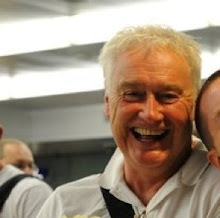
It’s that unholy hour between breakfast and the time the sun’s warmed the garden sufficiently for sitting out, which encourages either quiet reflection or a small sense of desperation, I’m not sure which.
I’m really enjoying the house and its facilities, in many ways it’s like being at home – everything I actually need is within reach, but the ticking of the clock is getting on my nerves. I mean the real ticking, of a cheap and rather ugly stainless steel wheel-spoke timepiece in the kitchen, not my life ebbing away. But that too.
I’m spending more time here than planned, mainly because of my own stupidity: my driving licence was due for renewal in early December. When I got the reminder I thought it was just a request to update the photograph and that the currency of the licence would continue normally while the vehicle agency received the picture and sent me a new card.
Evidently not, as the charming man at the Alamo car rental desk in the airport pointed out very gently once he’d deciphered the tiny numerals. Not even pretending there was an American/British differential in the way we recorded our date and month numbers saved me, American 3/12/11 being even earlier than ours. Fortunately Palm Springs is very walkable and nothing’s more than a short taxi ride away.
Ian’s rented a bike and has gone out to re-photograph whichever of the five hundred 1950s modernist buildings in Palm Springs have so far escaped his attention so I have the place to myself. I’m not complaining: travelling with a friend rather than a lover supplies just enough companionship to make it feel as though you’re not entirely alone, but our different circadian rhythms of sleep, eating and drinking mean the overlap is small.
He doesn’t like to compromise on those things, but then again why should he? It’s his holiday as much as mine and for once his preference for a 9.30pm bedtime actually suits this town which for nightlife at least is midway between sleepy and deceased.
So like all gay men with time on their hands, we turn to the internet for amusement. Oh, there is a Cable TV/DVD package in the property but we haven’t managed to turn it on, and the hosts thoughtfully didn’t provide any instructions how to use it: something else I’m not unduly distressed about because apart from anything else it’s meant I’ve learned how to download movies from iTunes.
Back to the internet. This being Palm Springs and me being something of a poster boy for the recentlly-developed category of ‘older gay men’ for which the town is somewhat notorious, I’ve been flattered by the attention.
What I’ve been less flattered by is the format in which the invitations to meet have been couched. They tend to be of the ‘Hot. I’ll be free at 4.45 for an hour if you care to come by’ rather than attended by flowers, dinner, kind or even polysyllabic words.
I am not such an old romantic or recycled Mama Cass as to assume that when love comes to me it will be with rockets, bells and poetry but I’d rather it wasn’t timetabled like a dental appointment and engendering the same amount of pleasure in its anticipation, despite the resemblance not only in the scheduling but also I suspect in the potential restriction of the dialogue to ‘open wide’ and ‘just a little prick’.
So, at least at the time of writing, I’ve resisted such temptations.
Almost everyone online here is trawling for sex outside their ‘committed relationship’, has come to Palm Springs on a sort of sexual tourism vacation to one of the clothing-optional gay ‘resorts’ in the desert (you get the feeling these resorts are automatically prefixed by ‘last’), or is somehow otherwise merely scratching the itch.
I’ve started reading ‘The Velvet Rage’ which is a book by American psychologist Alan Downs attempting to explain why gay men are so preternaturally angry and how our behaviour to each other in sexual and social interaction is so frequently brutal, but I haven’t got far enough into the chapters to reach the one about how to convert pruritic internet interest into actual affection and warmth.
That may need a sequel.

























